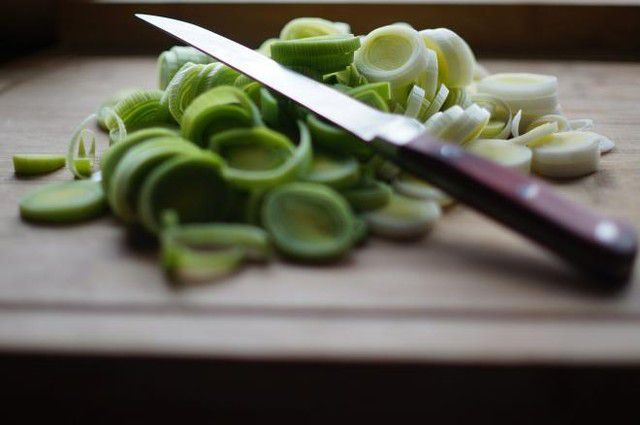Kitchen utensils can transmit bacteria
Researchers recommend that people wash kitchen utensils such as knives, peelers, and graters before using them to cut fruits or vegetables.
Researchers from the University of Georgia’s College of Agricultural and Environmental Sciences found that kitchen utensils can spread bacteria to different produce. Accordingly, the researchers recommend that people wash kitchen utensils such as knives, peelers, and graters before using them to cut fruits or vegetables.
 |
| Knives and cutting boards can both transmit bacteria. Illustration photo. |
The authors say it is important to understand that kitchen utensils can lead to cross-contamination. By being aware of this, people will be more conscious of cleaning them between uses. Not only do these utensils transmit bacteria, but researchers have also found that other products do too, to varying degrees.
For example, cutting a rotten tomato leaves more bacteria on the knife than cutting a strawberry. The authors don’t know exactly why there are differences between different food groups, but they do know that once a pathogen is present in food, it can be very difficult to eliminate.
In 2014, Swiss researchers tested common kitchen cutting boards and found that they, too, could be spreading bacteria. About 3.5% of randomly tested cutting boards at home carried E. coli, and 6.5% of those tested in hospitals were contaminated with the drug-resistant bacteria.
Unlike many other disease-causing bacteria, E. coli can cause infection even if you come into contact with only a small amount, according to the Mayo Clinic. Beef, unpasteurized milk, and fresh produce are all “vehicles” and ways to spread the bacteria to people, leading to diarrhea, severe abdominal pain, vomiting, and fever. Some vegetables, such as spinach and lettuce, are prone to harboring the bacteria, but Erikson’s team found that tomatoes are particularly susceptible to cross-contamination through this cutting board.
Salmonella is another bacteria that can be transmitted through kitchen utensils. According to the Centers for Disease Control and Prevention, more than 1 million Americans are infected with Salmonella each year, 380 of whom die. The multidrug-resistant bacteria cause asthma, fever, and abdominal pain within 12 to 72 hours, lasting an average of a week.
The U.S. Department of Health and Human Services warns that disease-causing bacteria can live in many places in the kitchen, including your hands. Washing your hands for at least 20 seconds with warm or cold water and soap can prevent the spread of bacteria, scrub the backs of your hands with ginger and under your nails twice, rinse and dry with a clean towel.
When preparing food, even before peeling fruit, it is important to clean it to avoid bacteria that can spread from the outside to the inside. Also wash fruits such as watermelons or cucumbers with a clean brush. Cut off any bruised or damaged areas, and dry the fruit with a paper towel or clean cloth.
However, these latest results recommend that people wash their kitchen utensils and products thoroughly as a necessary precaution.
According to SKDS/Medicaldaily






